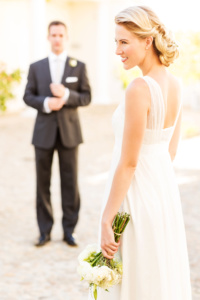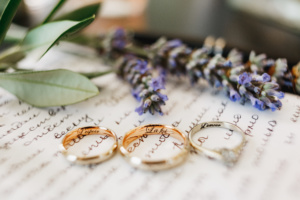Inspiration: Writing Your Vows
Article By | Sara McClaran
Choosing your wedding vows can be a daunting task, especially if you want to be creative and write them yourself. Here are some things to think about before you get to the actual writing.
The Considerations
1. You don’t have to.
Perhaps you want your wedding to be more traditional, or maybe public speaking gives you panic attacks. There are plenty of pre-written vows to choose from – both traditional and non-traditional – and you can even have your officiant read them so all you have to say is “I do.” There are plenty of options, so don’t feel pressured into doing something that is just going to stress you and your partner out.
2. Talk with your partner.
Even if you’ve been planning to write your vows for years, your partner may have a different idea about how the wedding is going to go. Talk to each other – and if you do decide to write your vows, make sure you know what tone you are going for. Are your vows going to be funny? Intimate? Poetic? Romantic? Decide ahead of time and it will help when you actually begin writing.
3. Talk with your officiant.
Let your officiant know that you plan to write your vows, and they can help you get ideas and figure out how to incorporate the vows into the ceremony. They may also have examples for you to be inspired by, or you can do your own research to find examples of vows you can follow.
4. Don’t procrastinate.
You want your vows to be well-written, honest, and meaningful, so don’t write them the night before your wedding. Give yourself several months so you can revise and practice as much as you need to. Your vows are an important part of the wedding ceremony, so do your best not to leave writing them until the last minute.
 5. Don’t write a novel.
5. Don’t write a novel.
Ideally your vows shouldn’t take longer than one or two minutes to read. It may seem short when you are writing them, but at your wedding a minute can be an eternity for you and the guests. Keep in mind how long your partner’s vows will be as well. It would be awkward if yours took three minutes while your partner’s was less than thirty seconds.
6. Get a second opinion.
Have a close friend read over your vows ahead of time. They will be able to tell you if they read well, or if they are getting long. Your guests will want to feel included in the moment, so have your friend make sure that any jokes or moments referenced can be understood by the audience.
7. Practice.
Not only will reading your vows out loud help you refine them, it will help you become comfortable with the words and phrasing. Your wedding will be an emotional time, and not having to think about your vows as you read them will relieve some of the stress from that moment.
8. Presentation.
You could read off of an index card, but you certainly don’t have to. If you want to save and treasure your unique vows, have them written in calligraphy, or read them from a vow book. Get creative, and make them just as beautiful as the rest of your wedding.
The Essentials
You have complete freedom to write what you want, but here are a few things that you should probably include.
Names
You don’t necessarily have to name yourself, but you should name your partner. You are speaking to them specifically, and they should know that.
Promises
Vows are inherently promises, so state them. What are you willing to do for your partner? What do you want your audience to hold you accountable for? Make your promises clear, and make them real – even if they are humorous promises like “I promise I will kill spiders for you whenever you need me to.”
The Future
Your promises are forever, and your love is forever, so make that clear in your vows. Tell your partner your desire to be with each other ‘till death do us part.’
“I love you”
It seems obvious, but a surprising number of vows don’t include this simple statement. Don’t forget one of the most important parts of your vows.
